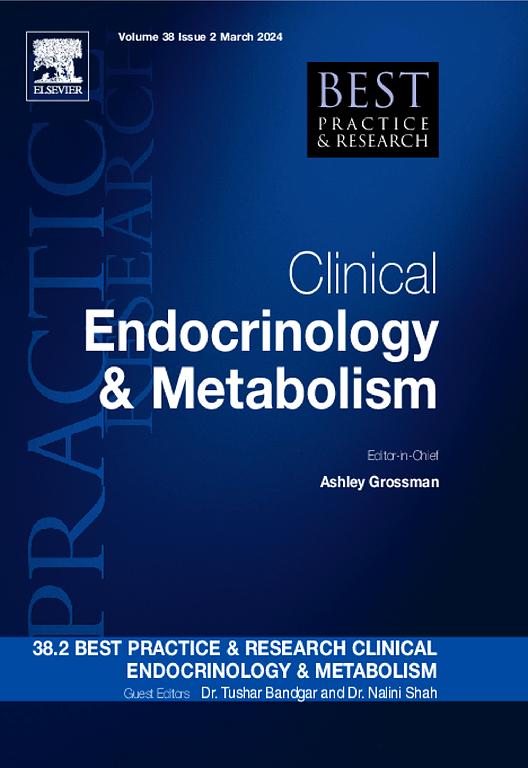Clinical manifestations and treatment of hypopituitarism due to traumatic brain injury
IF 6.1
1区 医学
Q1 ENDOCRINOLOGY & METABOLISM
Best practice & research. Clinical endocrinology & metabolism
Pub Date : 2025-05-01
DOI:10.1016/j.beem.2025.101996
引用次数: 0
Abstract
Traumatic brain injury (TBI) is a global health problem with rising incidence. In many patients, pituitary hormone deficiencies after TBI are transient; however, in some cases, they can persist or develop in the chronic phase. Post-traumatic hypopituitarism has a variable clinical course, reflecting its complex pathophysiology and incompletely understood risk factors. The diagnosis can be challenging, because symptoms of hypopituitarism may overlap with other TBI manifestations. Confirmatory endocrine testing is often required for diagnosis. Untreated chronic hypopituitarism can adversely affect physical, neurocognitive, and psychosocial rehabilitation; body composition; glucose metabolism; bone metabolism; and quality of life. Screening for hypopituitarism is recommended after moderate or severe TBI and for selected patients with mild TBI and suggestive clinical symptoms. Management requires an individualized multidisciplinary approach and consideration of endocrine pathology. In this review, we discuss the clinical manifestations and current management standards for hypopituitarism in adults with TBI.
外伤性脑损伤所致垂体功能减退症的临床表现及治疗。
外伤性脑损伤(TBI)是一个发病率不断上升的全球性健康问题。在许多患者中,脑外伤后垂体激素缺乏是短暂的;然而,在某些情况下,它们可以持续或发展为慢性期。创伤后垂体功能减退症的临床过程多变,反映了其复杂的病理生理和不完全了解的危险因素。诊断可能具有挑战性,因为垂体功能减退的症状可能与其他TBI表现重叠。确诊通常需要确认性内分泌检查。慢性垂体功能减退症未经治疗会对身体、神经认知和社会心理康复产生不利影响;身体成分;葡萄糖代谢;骨代谢;以及生活质量。建议在中度或重度脑外伤后,以及对轻度脑外伤和提示临床症状的患者进行垂体功能减退筛查。管理需要个性化的多学科方法和考虑内分泌病理学。在这篇综述中,我们讨论成人TBI的垂体功能减退症的临床表现和目前的管理标准。
本文章由计算机程序翻译,如有差异,请以英文原文为准。
求助全文
约1分钟内获得全文
求助全文
来源期刊
CiteScore
11.90
自引率
0.00%
发文量
77
审稿时长
6-12 weeks
期刊介绍:
Best Practice & Research Clinical Endocrinology & Metabolism is a serial publication that integrates the latest original research findings into evidence-based review articles. These articles aim to address key clinical issues related to diagnosis, treatment, and patient management.
Each issue adopts a problem-oriented approach, focusing on key questions and clearly outlining what is known while identifying areas for future research. Practical management strategies are described to facilitate application to individual patients. The series targets physicians in practice or training.

 求助内容:
求助内容: 应助结果提醒方式:
应助结果提醒方式:


